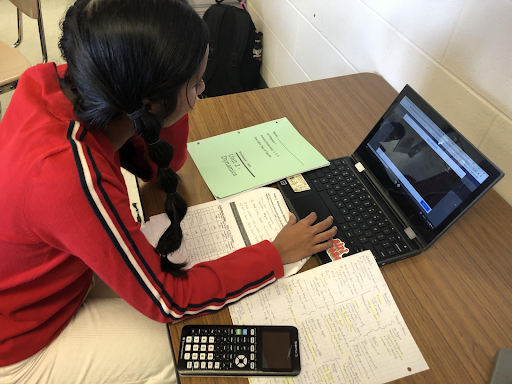Peering over a desk, you stare at a stack of papers scattered across the desk, alongside a laptop playing idle Quizlet noise and Youtube videos. Highlighted phrases and words that were once study material now appear to be jumbles of nonsense to such a tired mind. Your alarm clock glares at you from across the desk, reading “12:30.” You know that it is time to pack up and go to sleep, but tomorrow’s math test continues haunting, keeping you from resting.
As the year goes on, schoolwork piles up, and students are often left without time to study for tests in advance, forcing them to “cram” all of their knowledge in their brain in a rigorous studying session, often the day or night before an assessment. Maintaining a social life is almost impossible to do while taking difficult courses such as AP Calculus BC without cramming often.
“Some weekends I have to choose between hanging out with friends and making sure that I’ve studied enough for a Calc BC quiz during the next week,” senior Eduardo Bonzi said.
Junior Ada Hillman feels that students cram because many of them feel pressured to take honors and AP classes that move fast.
“When you’re taking a lot of those classes, it’s hard to find time to pace out your studying because the class is moving so fast. Right now I probably study the most for my micro, physics, and pre-calc classes,” junior Ada Hillman said.
Although most students agree that cramming is not a helpful practice for mental health, it is important that everyone fosters good study habits in order to have a more efficient, fulfilling cram session, or even to prevent the need for cramming altogether.
“Memorization is key for me. Usually if a student is cramming, they are behind or haven’t finished worksheets that were due in the class. If you do those, it is a good way to finish late work while studying the class’ content. Flashcards are also super helpful,” Hillman said.
Junior Sara Elster takes notes in class and reads and highlights them to study in a short period of time.
“I used to use Quizlet but they make you pay now, so not anymore. I also like using Youtube, like I use Heimler’s History all the time. Khan Academy is good for math,” Junior Sara Elster said.
Bonzi believes having a helpful teacher is an important factor in performing well in a fast-paced class.
“I definitely do a lot better and have a much easier time studying when the teacher helps with review guides, study sessions, and stuff like that. When the teacher offers help, I don’t feel as pressured to last-minute cram,” Bonzi said.


































